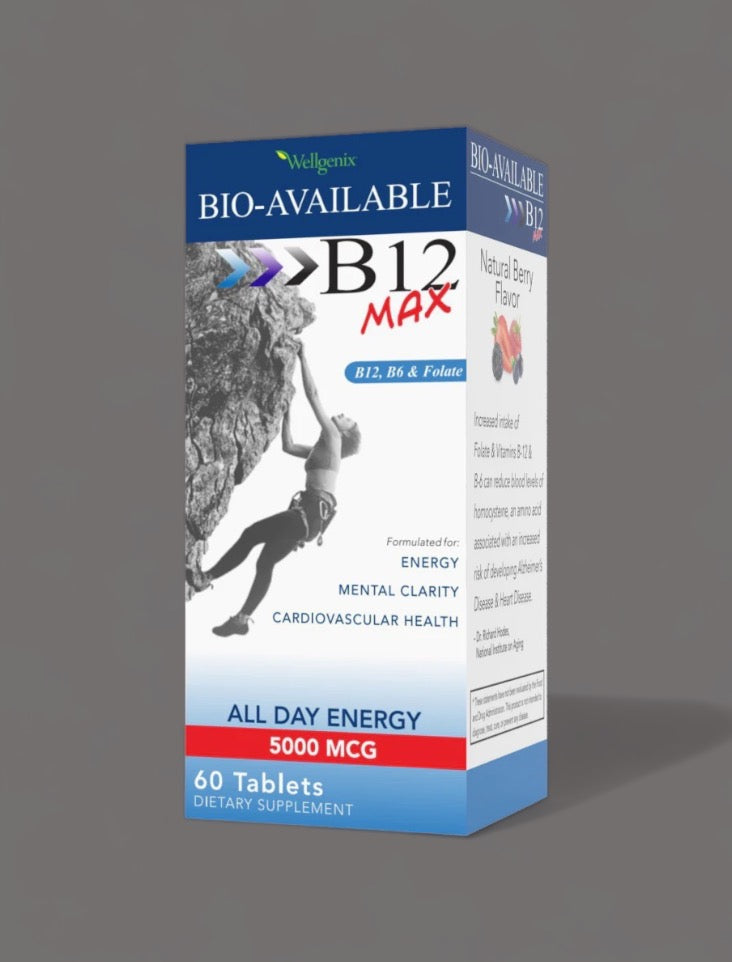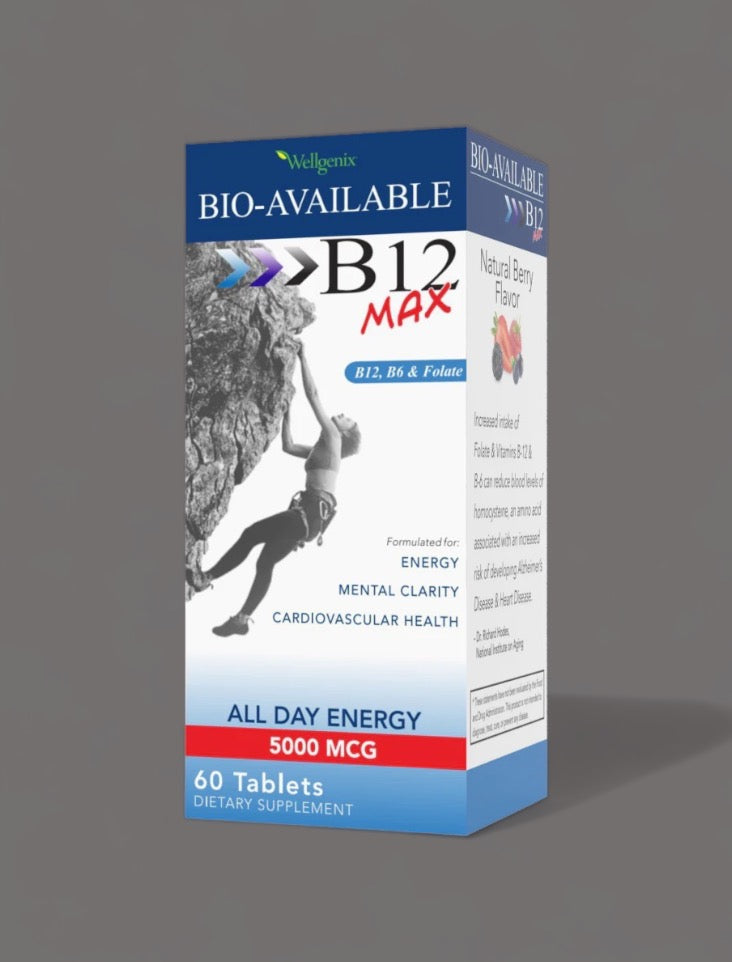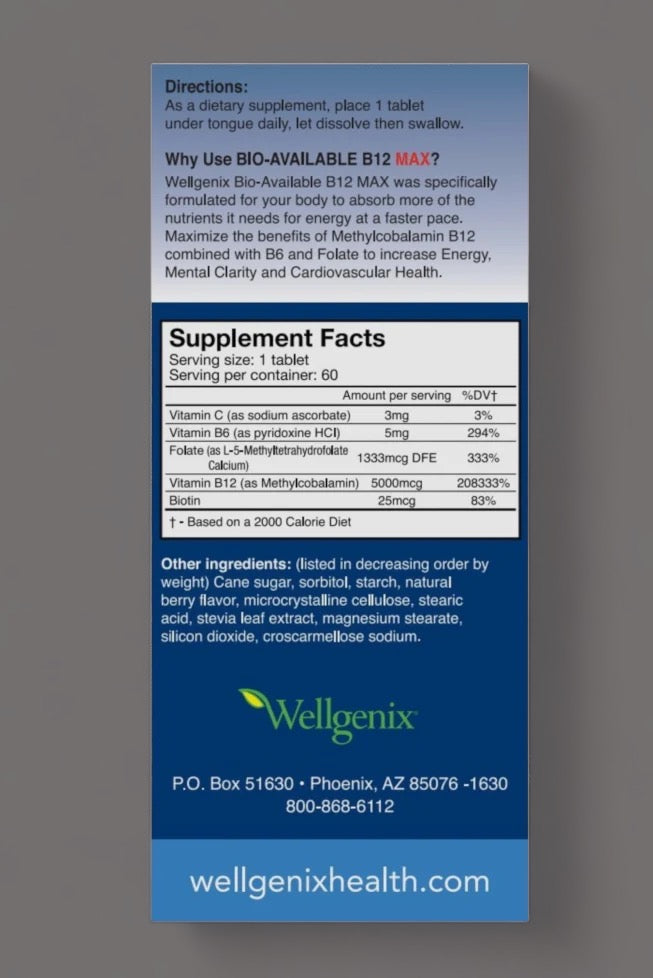Vitamin B12 supports some of the body’s most important functions, including the support of the central nervous system, the creation of red blood cells and the synthesis of DNA. It’s essential that your body receives sufficient levels of this nutrient to achieve optimal health. Vitamin B12 deficiencies could adversely affect your wellbeing leading to changes in mood, fatigue, and decreased energy.
What is Vitamin B12?
Vitamin B12, like the other B vitamins, is important for protein metabolism and plays numerous roles in the body from enhancing energy levels, improving memory, and reducing heart disease. Vitamin B12 supports the normal function of your nerve cells, and is needed for red blood cell formation, and the production and regulation of DNA.
Sources of Vitamin B12
Your body does not produce vitamin B12, but it occurs naturally in some of the foods we eat such as meat, poultry, fish, and dairy products, such as milk, yogurt, and cheese. Not many fruits and vegetables have B12, vegans and vegetarians therefore have a higher risk of deficiency.
Manufacturers can produce B12 through bacterial fermentation and synthesis, making it available in fortified foods and oral supplements that can be easily absorbed into the system. Vitamin B12 injections or nasal sprays may be prescribed to treat vitamin B12 deficiency.
Recommended Intake
For most adults, the Recommended Dietary Allowance of vitamin B12 is 2.4 micrograms (mcg), daily. For women who are pregnant or breastfeed, the amount increases to 2.6mcg and 2.8mcgs daily, respectively. Low stomach acid and aging can lower the ability to absorb the vitamin. Those over age 50 are encouraged to consume fortified foods or supplements containing B12.
Various Functions of Vitamin B12
Red Blood Formation
Vitamin B12 plays a vital role in the production of red blood cells, which support the transportation of oxygen to your vital organs. It also prevents anemia. Low levels of B12 can cause a reduction of red blood cell formation and inhibit them from forming properly.
Without the proper nutrients, the body produces large and irregular shaped blood cells that are unable to move from the bone marrow into the blood stream at an appropriate rate, reducing their ability to carry oxygen. Symptoms include fatigue, weakness, dizziness, and shortness of breath.
Boosts Energy Levels
B12 is often touted for its ability to boost energy. While vitamin B12 does not directly provide energy, it is instrumental in helping cells in the body perform the necessary chemical reactions to provide the body with the energy required to power the body. Getting the recommended daily amount of B12 can therefore ensure that the body has the energy to perform daily tasks without feeling weak, tired, or drowsy.
Enhances Cognition Functions
Vitamin B12 supports cognitive functions by preventing the loss of neurons in the brain, often associated with memory loss and dementia. Studies have shown that a deficiency in vitamin B12 could contribute to poor memory performance. Another study in people with early-stage dementia showed that a combination of vitamin B12 and omega-3 fatty acid slowed mental decline.
Support Bone Mineral Density
Vitamin B12 may play a vital role in your bone health. Low blood levels of vitamin B12 have been associated with an increased risk of osteoporosis, decreased bone mineral density, and increased risk of bone fracture. As we age it’s particularly important that we receive adequate amounts of vitamin B12 to maintain proper bone health.
Reduce Risk of Age-Related Macular Degeneration
Vitamin B12 may also help prevent the risk of age-related macular degeneration (AMD), an eye disease that affects your central vision. It arises from a complex interplay among aging, genetic susceptibility, and lifestyle factors. Elevated levels of homocysteine, a type of amino acid found in the bloodstream, have been associated with AMD. Studies find that intake of B vitamins, including folate and vitamins B6 and B12, help regulate levels homocysteine and reduce risk factors associated with AMD.
Improves Heart Health
The B vitamins (folate, B6 and B12) play vital roles in the metabolism of homocysteine. Deficiency of either of these B vitamins can lead to an elevated level of total homocysteine, which has been implicated in the development of cardiovascular disease. Adequate intake of B vitamins is shown to normalize homocysteine levels and reduce risk factors associated with cardiovascular disease and circulatory health problems.




